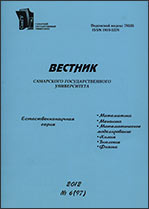|
Mathematical Modelling
Mathematical modeling as a method of forming cognitive universal learning actions and competences of students in the conditions of a holistic educational environment
V. N. Aniskina, D. K. Rakhmatullinab
a Samara State University of Social Science and Education, Samara, Russian Federation
b Municipal budgetary educational institution secondary school of the village Karnovar, Neverkinsky district,
Penza region, Russian Federation
(published under the terms of the Creative Commons Attribution 4.0 International License)
Abstract:
From the standpoint of information and educational holism $\Sigma $ ieh, conditions and features of the transitional period of digital transformation of education, the didactic potential of mathematical modeling in the formation and development of cognitive universal learning activities (ULA) in mathematics lessons for schoolchildren and universal competencies (UC) in the study of mathematical and methodological methods is analyzed-mathematical disciplines by students of universities of the direction of preparation Pedagogical education. Based on the compatibility of the requirements of the federal state educational standards of secondary general and higher education (FSES SGE and FSES HE), which determine the conditions and features of the formation and development of universal learning activities in schoolchildren and universal competencies in students — future teachers of mathematics, the optimizing effect of $\Sigma $ ieh on these processes. The possibilities of mathematical modeling are considered as an educational technology that makes it possible to increase the efficiency of obtaining, assimilation and application of new subject and methodological knowledge by students in conditions of mixed offline- and online-learning. A model of information and educational holism and examples of tasks are given.
Keywords:
digitalization of education, math modeling, information and educational holism, holistic educational environment, cognitive ULA, UC, training teachers of mathematics, development of personal qualities of students.
Received: 31.07.2023
Revised: 04.09.2023
Accepted: 30.10.2023
Citation:
V. N. Aniskin, D. K. Rakhmatullina, “Mathematical modeling as a method of forming cognitive universal learning actions and competences of students in the conditions of a holistic educational environment”, Vestnik SamU. Estestvenno-Nauchnaya Ser., 29:3 (2023), 79–92
Linking options:
https://www.mathnet.ru/eng/vsgu714 https://www.mathnet.ru/eng/vsgu/v29/i3/p79
|

| Statistics & downloads: |
| Abstract page: | 61 | | Full-text PDF : | 20 | | References: | 17 |
|




 Contact us:
Contact us: Terms of Use
Terms of Use
 Registration to the website
Registration to the website Logotypes
Logotypes









 Citation in format
Citation in format 